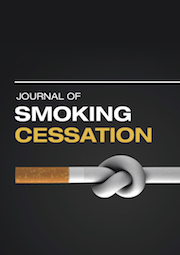No CrossRef data available.
Article contents
Association of Weight Perception, Race and Readiness to Quit Smoking amongst a Cohort of Workers
Published online by Cambridge University Press: 12 December 2016
Abstract
Introduction: Weight concerns may inhibit smoking quit attempts and may be more influential amongst African-Americans who are more likely to be overweight.
Aims: To assess if weight perception is associated with readiness to quit and whether this relationship is modified by race.
Methods: We used data from a cohort of current smokers undergoing routine health examinations. Based on differences between ideal and measured BMI, participants’ weight perceptions were classified as within, somewhat above, or far above ideal weight. Logistic regression analysis was used to evaluate adjusted associations of weight perception and race with readiness to quit.
Results: Of 2,831 current smokers, 23% were obese and 38% overweight. Amongst white smokers, those who perceived being far above ideal weight were more likely to be ready to quit (OR: 1.45, 95% CI: 1.03–2.03), but this association was not observed for African-American smokers who perceived themselves to be somewhat or far above their ideal weight (OR: 0.35, 95% CI: 0.10–1.24 and OR: 0.36, 95% CI: 0.11–1.19, respectively).
Conclusions: Perception of being overweight is associated with increased readiness to quit amongst white but not African-American smokers. Smoking cessation programmes may need to culturally tailor interventions based on smokers’ weight perceptions.
- Type
- Original Articles
- Information
- Copyright
- Copyright © The Author(s) 2016


